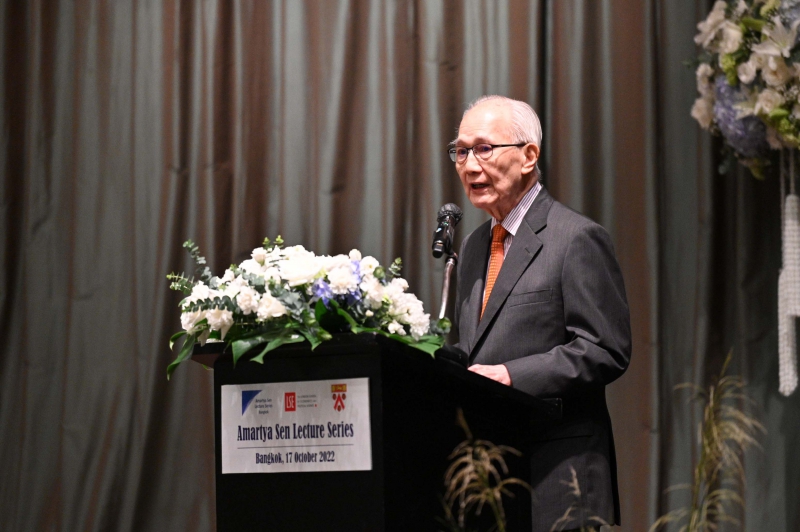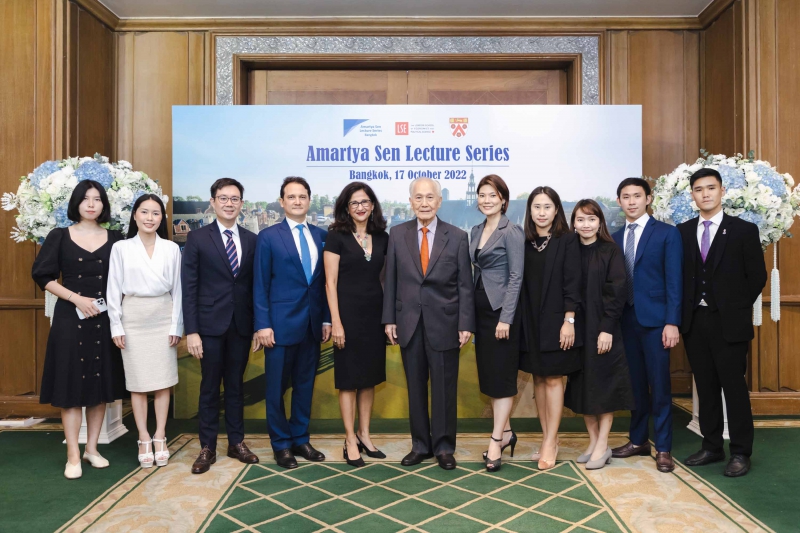What We Owe Each Other
What We Owe Each Other

H.E. Mr. Anand Panyarachun, Chairman of Amartya Sen Lecture Series Bangkok, hosted a lecture at the Grand Hyatt Erawan under the topic of “What We Owe Each Other” by Baroness Minouche Shafik, Director of the London School of Economics and Political Science (LSE) sharing her thoughts regarding our need for a new social contract for the 21st century, with Professor Amartya Sen, Nobel Prize Economist, and Professor Elizabeth Robinson as panelists. The event was organized by Joe Horn-Phathanothai, CEO of Strategy613 and Napawong Snidvongs Na Ayuthaya, Co-Chairman of LSE Alumni Thailand, and included notable guests such as H.E. Dr. Chirayu Isarangkun Na Ayuthaya, Bangkok Governor Chadchart Sittipunt, Dr. Piyasvasti Amranand, Khunying Jada Wattanasiritham, Chote Sophonpanich, Isara Vongkusolkit, Saravoot Yoovidhya, Ambassadors and Representatives from more than 10 embassies.



Professor Amartya Sen is the 1998 Nobel Prize Laureate in Economic Sciences. He has associations with many of the world’s top universities, including Cambridge, the LSE, Oxford and Harvard. His contribution to the field of development economics is difficult to overstate. He introduced a holistic view of human development, and changed the way agencies such as the World Bank and the UN evaluate their achievements. He is also a leading scholar on the topic of this year’s Lecture, namely the social contact.
Following the retirement of Professor Sen as Master of Trinity College, Cambridge in 2004, the Amartya Sen Lecture Series was launched by alumni of Trinity College. Through lectures which bring speakers of the highest level to stimulate discussion, the Series intends to help raise the quality and profile of public debate about issues such as sustainable development, the environment, justice, democracy.



In 2015, khun Anand Panyarachun – who studied at Trinity College, Cambridge at the same time as Professor Sen – and Joe Horn-Phathanothai brought the Lecture Series to Asia. Following the success of the first two Lectures in Bangkok, featuring Bank of Japan Governor Haruhiko Kuroda, and then OECD Secretary-General Angel Gurría, khun Anand and Joe invited Baroness Minouche Shafik, the Director of the LSE, to give a talk on the topic: “What We Owe Each Other”.
Khun Anand Panyarachun, in his opening remarks, noted that while he was studying in Cambridge with Amartya Sen in the 1950s, the social contract was very different. Over the subsequent decades, we have seen rising life expectancy, improved education, increased prosperity, and lower birth rates, all leading to fundamental changes in this contract. Today, in the face of a “new normal” created by Covid and looming environmental catastrophe, we are in need for a new social contract.
Baroness Minouche Shafik described the various social contracts that bind people and their government, families, societies. Some are “unspoken agreements” such as those between generations of a same family, or between husbands and wives in relation to household chores or the raising of children. Others are formal contracts, like the provision of pensions by employers. And then there are the contracts between us and our governments, such as the provision of healthcare and education. Contrary to popular belief, much of the social payouts one receives from the government, whether during the early stages of life, in the form of education, or at the later stages of life, in the form of healthcare, are not from redistributed income from “the wealthy”, but are prepaid/post-paid contributions from one’s own savings in the form of taxes paid to the government during our working years.
After her talk, Baroness Shafik was joined on a panel discussion with Professor Sen and Professor Liz Robinson. The panel was moderated by Joe Horn-Phathanothai. Professor Robinson is a top environmental scientist, and heads LSE’s Grantham Research Institute on Climate Change and the Environment one of the most reputable research centres on the topic.
During the panel discussion, Professor Robinson addressed the need for a new social contract in order to solve the problem of environment degradation. Climate action needs to be taken now, or never. Professor Sen also remarked how ageing society should not be viewed as a problem, but rather more positively as a reality that we will all have to face.




